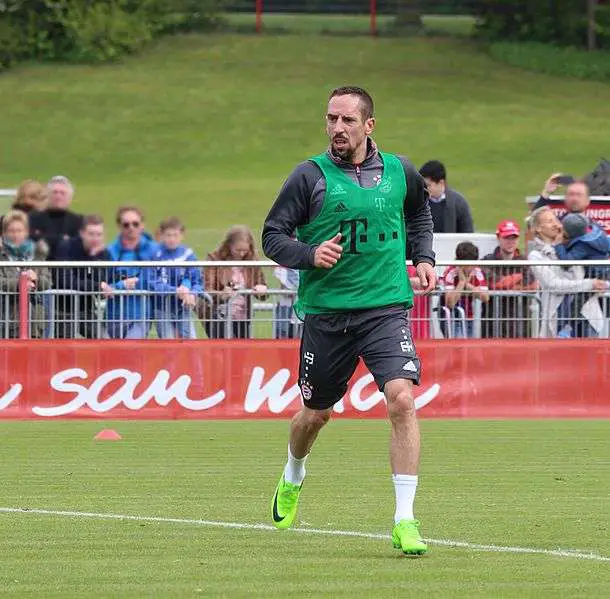As the players of Bayern Munich and Eintracht Frankfurt lined up for the final game of the season, with a title on the line for one side and Champions League football at stake for the other, you would have been excused for parking sentimentalises to one side, in favour of staying focused on the task ahead. But, as 75,000 fans applauded his name, Franck Ribery – holding the tears back, appeared to understand the magnitude of the day. He was just about to play his last ever game in the red of Bayern Munich, alongside fellow club legends Rafinha and Arjen Robben. But, as ever, Frank appeared to be feeling the emotion of the moment more than most. He even managed to score during the 5-1 win, with typical Ribery-esque grace, a storybook ending for a club legend. Here stood one of Germany’s best ever footballing imports, who, over the span of 12 years, won more Bundesliga titles that any other Bayern player. His mark on German football is immeasurable, as he also leaves the country as the Bavarian’s record appearance holder for a non-German player, eclipsing the clubscurrent sporting director Hasan Salihamidzic.
Today, we may take Ribery’s transfer for granted, seeing him as just another example of footballs trend toward globalisation. Another example too of the Bundesliga’s standing as one of Europe’s top leagues, attracting talent from all four corners of the continent.
That couldn’t have been further from the truth in July 2007, when the Frenchman first arrived for a then eye watering €27 million. Prior to Ribery’s arrival from Marseille, the Bundesliga’s biggest stars essentially read as a list of German’s best national team players. Bastian Schweinsteiger, Michael Ballack, Miroslav Klose, Lukas Podolski…all fresh from World Cup heartache in 2006, were the face of a league in need of rejuvenation. That though, would soon arrive, with Ribery and prolific Italian striker Luca Toni both coming to Bayern Munich for big money in the summer of 2007, with a certain flying dutchman not far behind – but more on him later.
Frank Ribery arrived in Germany with a big reputation, with Bayern having to fend off interest from England and Italy to secure his signature. After a stellar two years at Marseille, where he helped guide the team to a second-place finish in Ligue 1, Ribery also had an impactful 2006 World Cup, in Germany of all places. He even scored against Spain in the last 16, with his performance level catching the eye of the soon to be retired Zinedine Zidane, who crowned Ribery as the new “jewel” of French football. At the time of Ribery’s arrival, Bayern was on its knees, after the 2006/07 season ended with a fourth placed Bundesliga finish, and no silverware. That failure lit a fuse, as the following summer would see Bayern spend almost €40m on Ribery and Toni. Ribery, unfazed by his price tag, started life well at the Allianz, scoring 11 times and laying on eight assists in the process. Bayern also enjoyed domestic success, achieving a league and cup double, with Toni, becoming the Bundesliga’s top scorer.
It doesn’t seem unreasonable to brand Ribery as somewhat of a Bundesliga pioneer, for his 2007 move broke the mould in so many ways. In the years that would follow, more and more big-name imports, from all across the world, began to light up Germanys top flight, in a way not previously seen. From Luca Toni to Thiago, from Arturo Vidal to Pierre-Emerick Aubameyang, and even, you guessed it – Arjen Robben. Few partnerships in world football can claim to be as iconic as “Robbery”, as apt a nickname as you’ll find for the men who occupied Bayern’s flanks for over decade. Robben came to Bayern two years after Ribery, with their very first game together being a 3-0 win at high flying Wolfsburg in 2009. The game was the first indication of what to expect in the coming years – two goals for Robben, both assisted by the Frenchman. Magnifique.
Ribery and Robben were incredibly effective in attack, often in very different ways. Robben, with an eternal thirst for goals, perfected a move that would go on to become his trademark; cutting inside from the right, before unleashing a shot that, more often than not, arrowed into the side netting. Ribery on the other hand, drifted seamlessly between creator and finisher, as capable playing in the 10 as he was on either wing. In this sense then, few games capture the destructive brilliance of Robbery quite like the 2013 Champions League final. Little did they know it at the time, but 2013 would prove to be both players last appearance to date in a Europe’s club game of the season. The magnitude of that match for Robben and Ribery cannot be overstated, as in the years prior, both men had lost two Champions League finals with Bayern (2012 and 2010, where Ribery was suspended) as well both ending up on the losing side at the previous two World Cup finals (Ribery in 2006, Robben in 2010). However, this time around, they made sure Bayern wouldn’t be denied. In a close all German final against Jürgen Klopp’s Borussia Dortmund side, a Ribery back heel, by way of deflection, would present Robben with the chance to win the game – the Dutchman duly obliged. An 89thminute winner to beat your biggest rivals late on? It was ‘Robbery’ in every sense of the word. The legendary partnership was born.
2013 as a year would prove to be Ribery’s crowning glory, with him undoubtably experiencing his best footballing spell under the expert guidance of manager Jupp Heynckes. A historic Bayern treble was capped off in January 2014, with Ribery finishing third in the previous year’s Ballon D’or vote – only edged out by Messi and Ronaldo. The following five seasons, under Pep Guardiola and, most Recently, Nico Kovač, brought yet more domestic success, culminating in this seasons’ seventh straight league title win. Injury would stymie playing time as age also began to catch up with the winger, but his role as a leader in Bayern dressing room cannot be overstated. The hole that both him and Robben leave behind will be noticed, and the task of emulating Robbery’s success – that falls on the shoulders of Serge Gnarby, Kinglsey Coman and maybe even Callum Hudson-Odoi, is an almost impossible one.
Of course, it goes without saying that the career of Franck Ribery is not without its fair share of controversy. Ever the prankster, his early days at Bayern involved two incidents that made headlines – one involving pouring water on legendary keeper Oliver Khan, as well as commandeering the team bus on a pre-season trip to Dubai. Ribery was also said to have had a frosty relationship with former manager Louis van Gaal, and his temper resulted in him missing the 2010 Champions League final after receiving a three-match ban for serious foul play. Most recently, Ribery, after purchasing a £1000 golden steak in Dubai, was criticised for posting an expletive ridden rant blasting those who questioned his purchase. The post, from January of this year included Ribery saying “f*** your mothers, your grandmothers and even your family tree. I owe you nothing.”
With Frank though, the personality was all part of his charm, much like the infamous scar, still visible today across his right cheek. The scar, inflicted in a car accident when Frank was just a toddler, is almost as iconic as his playing style, with Ribery himself eloquently explaining to French television how it “gave me character and strength”. He’s a player who wears his heart on his sleeve, and in spite of his numerous scandals, for that reason, the Bayern fans always embraced Ribery as one of their own.
The number 7 shirt, which he has worn since day one, will surely weigh heavy on whomever is tasked with inheriting it. As with any iconic number, the comparisons to legends gone by are never entirely fair, especially when that legend has won as much as Franck Ribery. He leaves a nine time Bundesliga champion, a five time winner of the DFB Pokal, and, of course, as a Champions League winner for good measure. On an individual level, not only was he third in the 2013 Ballon D’or vote, but that season he was also named UEFA European player of the year for the 12/13 season. Ribery has had the most Bundesliga assists in a season on three separate occasions, and leaves Bayern with a combined total of 124 goals in 424 games for the club.
As a foreign player in Germany, his impact is only matched by his old partner in crime – and so, how right it is then that Ribery and Robben depart at the same juncture. “They’ll never forget what we’ve done together,” Ribery told Deutsche Welle, barely managing to hold back the tears.
At the age of 36, Ribery’s storied career may not yet be over, but Saturday did conclude a remarkable chapter in Bundesliga history, one defined by a Frenchman whose unpredictable genius saw him bend German football to his will. He leaves the Bundesliga knowing that the league of today is immeasurably different to the one he first stepping into almost 12 years ago – in part, thanks to him. He remains a trailblazer in more ways than one, and will surely go down as one of, if not THE greatest ever foreign-born player to wear the famous Bayern colours.
By Tom Fenton.










